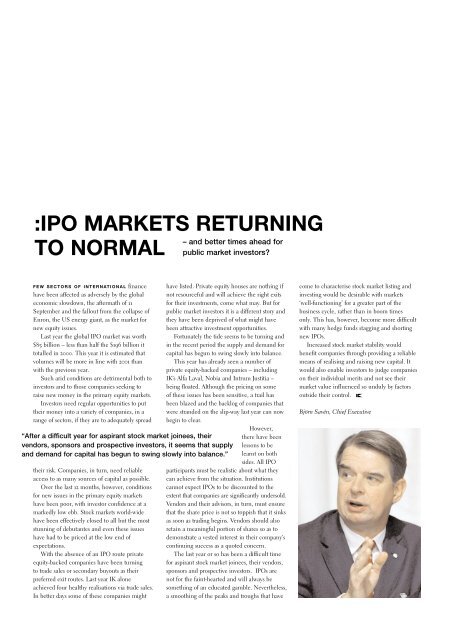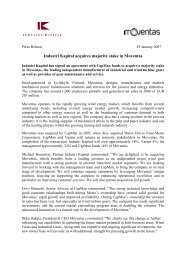Download IK News - IK Investment Partners
Download IK News - IK Investment Partners
Download IK News - IK Investment Partners
Create successful ePaper yourself
Turn your PDF publications into a flip-book with our unique Google optimized e-Paper software.
:IPO MARKETS RETURNING<br />
– and better times ahead for<br />
TO NORMAL public market investors<br />
FEW SECTORS OF INTERNATIONAL finance<br />
have been affected as adversely by the global<br />
economic slowdown, the aftermath of 11<br />
September and the fallout from the collapse of<br />
Enron, the US energy giant, as the market for<br />
new equity issues.<br />
Last year the global IPO market was worth<br />
$85 billion – less than half the $196 billion it<br />
totalled in 2000. This year it is estimated that<br />
volumes will be more in line with 2001 than<br />
with the previous year.<br />
Such arid conditions are detrimental both to<br />
investors and to those companies seeking to<br />
raise new money in the primary equity markets.<br />
Investors need regular opportunities to put<br />
their money into a variety of companies, in a<br />
range of sectors, if they are to adequately spread<br />
their risk. Companies, in turn, need reliable<br />
access to as many sources of capital as possible.<br />
Over the last 12 months, however, conditions<br />
for new issues in the primary equity markets<br />
have been poor, with investor confidence at a<br />
markedly low ebb. Stock markets world-wide<br />
have been effectively closed to all but the most<br />
stunning of debutantes and even these issues<br />
have had to be priced at the low end of<br />
expectations.<br />
With the absence of an IPO route private<br />
equity-backed companies have been turning<br />
to trade sales or secondary buyouts as their<br />
preferred exit routes. Last year <strong>IK</strong> alone<br />
achieved four healthy realisations via trade sales.<br />
In better days some of these companies might<br />
have listed. Private equity houses are nothing if<br />
not resourceful and will achieve the right exits<br />
for their investments, come what may. But for<br />
public market investors it is a different story and<br />
they have been deprived of what might have<br />
been attractive investment opportunities.<br />
Fortunately the tide seems to be turning and<br />
in the recent period the supply and demand for<br />
capital has begun to swing slowly into balance.<br />
This year has already seen a number of<br />
private equity-backed companies – including<br />
<strong>IK</strong>’s Alfa Laval, Nobia and Intrum Justitia –<br />
being floated. Although the pricing on some<br />
of these issues has been sensitive, a trail has<br />
been blazed and the backlog of companies that<br />
were stranded on the slip-way last year can now<br />
begin to clear.<br />
However,<br />
there have been<br />
lessons to be<br />
learnt on both<br />
sides. All IPO<br />
participants must be realistic about what they<br />
can achieve from the situation. Institutions<br />
cannot expect IPOs to be discounted to the<br />
extent that companies are significantly undersold.<br />
Vendors and their advisors, in turn, must ensure<br />
that the share price is not so toppish that it sinks<br />
as soon as trading begins. Vendors should also<br />
retain a meaningful portion of shares so as to<br />
demonstrate a vested interest in their company’s<br />
continuing success as a quoted concern.<br />
The last year or so has been a difficult time<br />
for aspirant stock market joinees, their vendors,<br />
sponsors and prospective investors. IPOs are<br />
not for the faint-hearted and will always be<br />
something of an educated gamble. Nevertheless,<br />
a smoothing of the peaks and troughs that have<br />
“After a difficult year for aspirant stock market joinees, their<br />
vendors, sponsors and prospective investors, it seems that supply<br />
and demand for capital has begun to swing slowly into balance.”<br />
come to characterise stock market listing and<br />
investing would be desirable with markets<br />
‘well-functioning’ for a greater part of the<br />
business cycle, rather than in boom times<br />
only. This has, however, become more difficult<br />
with many hedge funds stagging and shorting<br />
new IPOs.<br />
Increased stock market stability would<br />
benefit companies through providing a reliable<br />
means of realising and raising new capital. It<br />
would also enable investors to judge companies<br />
on their individual merits and not see their<br />
market value influenced so unduly by factors<br />
outside their control.<br />
Björn Savén, Chief Executive

















